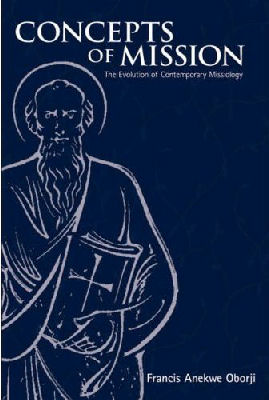
|
Posted January 25, 2007
Book: Concepts of Mission: The Evolution of Contemporary Missiology Author: Francis Anekwe Oborji Orbis. Maryknoll, NY. 2006. Pp. 240 An Excerpt from the Foreword:
An Excerpt from the Book: Missiology has the task of constantly examining its own terminology and that of other branches of theology in relation to missin and the people being evangelized. One aspect of this role of missiology is the traditional way of perceiving the people of so-called mission lands. Today missiology is challenged to examine and rethink the terminology used with reference to mission. Clearly such language — often an attempt to attract financial donors for the traditional missions of the church in general and for specific missionary congregations – tends to highlight a bizarre image of the people of the so-called mission land and makes the recipients of mission look like abject objects of charity (Africa seems to have suffered most from this stereotype). As a theological discipline, missiology is a process of communication and proclamation. As such, it has, in the first place, a frontline role in the proclamation of salvation and restoration of human dignity in Jesus Christ. This means that learning a theological language appropriate to rendering this insight should be important in mission studies. And because missiological reflection must accompany the three concrete situations in which the church carries out her mission today — mission ad gentest, pastoral care, and new evangelization — one of the central tasks of missiology is to articulate the theological foundations of the church’s missionary activity and to examine carefully the various ways in which the church exercises her mission. Finally, and in keeping with the basic argument of the present study, missiology must take the lead in the effort to promote dialogue in theological studies. In addition to promoting studies of its traditional subjects, missiology must also encourage the ongoing dialogue between the dominant theology of the North Atlantic and the emergent theologies of the Third World. To engage in a dialogue of this kind, missiology must enter into specific studies and develop its own methods of reflection and research into areas such as evangelization, ecumenism, inculturation, interreligious dialogue, human promotion and liberation, and so forth. These themes, which have been described as “new means of mission,” receive special attention and an in depth approach in theological writings that are emerging in various cultural zones of the globe. Missiology has the task of examining the theological languages of these contextual theologies and of promoting dialogue between them and previously dominant themes of traditional theology. It is on these principles (among others) that missiology must find its distinct role in theological education. This remains a hazardous undertaking. Every branch of theology — including missiology — remains fragmentary, fragile, and preliminary in our rapidly changing era. In other words, missiology proves itself a theological discipline also insofar as it remains missiologia semper reformanda. Only in this way can missiology become not only an ancilla theologiae (“handmaiden of theology”), but also an ancilla Dei mundi (“handmaiden of God’s world”) Table of Contents: Part 1: Basis Issues 1. Mission in contemporary missiology 2. Mission and the growth of missiology Part 2: Historical perspectives 3. Mission as conversion 4. Mission as church planting and growth 5. Mission as adaptation and inculturation 6. Mission as dialogue with the religions 7. Mission as Missio Dei and service of God’s reign Part 3: New Perspectives 8. Mission as ecumenical dialogue 9. Mission and the contextual theologies 10. Drawing threads together |
|
